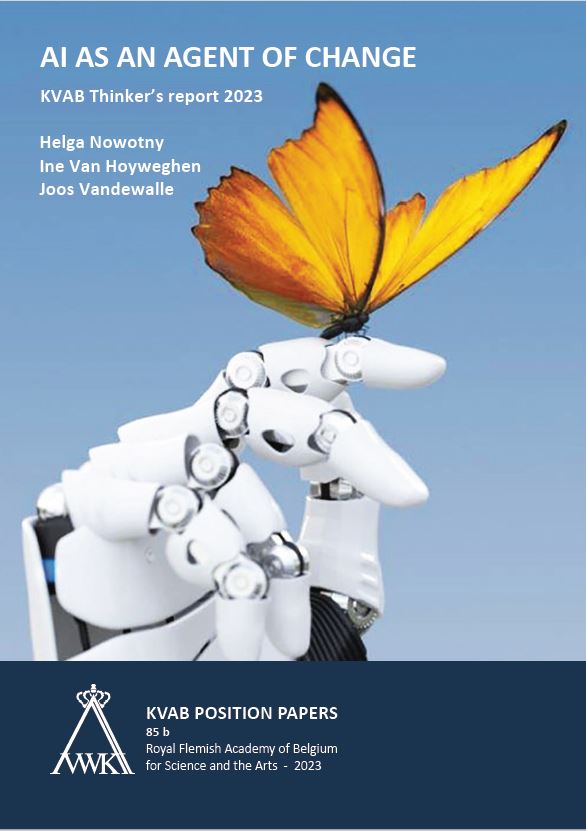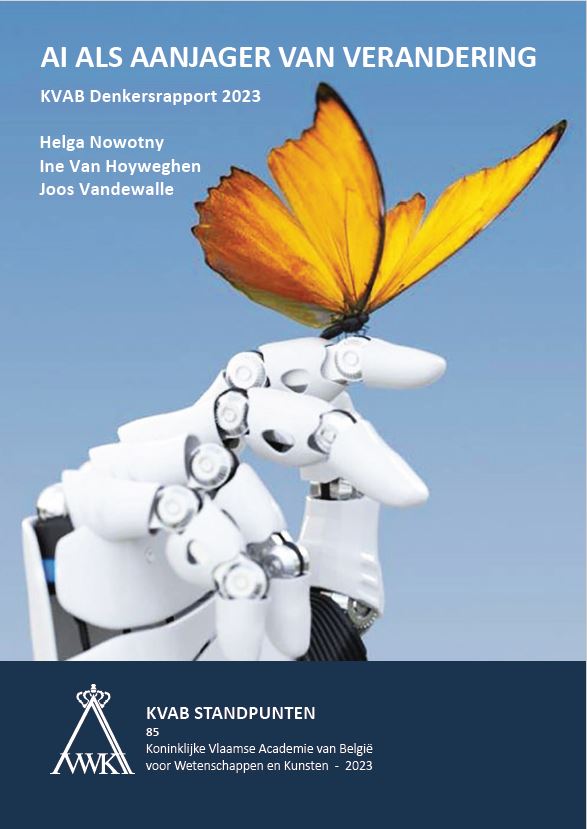AI als aanjager van verandering

Position Paper | Year 2023
AI as an agent of change
Class of the Humanities
Within the framework of the Thinker’s Program of the Royal Flemish Academy
of Belgium for Sciences and Arts (KVAB), the 'Thinker-in-residence', Helga
Nowotny, has formulated in-depth insights into the current practice and
the possible future of Flemish Artificial Intelligence (AI) research and
wider society.
Even though Artificial Intelligence (AI) tools are not magic but the simple result of mathematical optimization, massive computer power and data sets, these tools are imbued with extraordinary promise. They have managed to generate substantial benefits already, particularly in the form of enhanced efficiency, accuracy, timeliness and convenience across a wide range of research and services, products and processes, including healthcare, genomics, fusion research, product design and simulation, autonomous systems, predictive maintenance, quality control, inspection processes and environmental impact assessment.
At the same time, the emergence of AI has been accompanied by rising concerns about its potential risks and damaging effects: for individuals, for vulnerable groups and for society more generally. This raises questions as to how AI will affect our everyday life, in both its private and its professional contexts, as well as influence our views of who we are as human beings. This requires a human-centered approach in the design, use and further development of AI, which entails an alignment with human values and needs. We must shape technologies in accordance with human values and needs, instead of allowing technologies to shape humans.
With generative AI systems such as ChatGPT developing at lightning speed, it is crucial that the scientific community plays a central role in shaping a human-centric approach to AI. This Thinker’s Cycle of the KVAB aims to highlight the impact of these latest developments in AI and to reflect on the way forward.
Even though Artificial Intelligence (AI) tools are not magic but the simple result of mathematical optimization, massive computer power and data sets, these tools are imbued with extraordinary promise. They have managed to generate substantial benefits already, particularly in the form of enhanced efficiency, accuracy, timeliness and convenience across a wide range of research and services, products and processes, including healthcare, genomics, fusion research, product design and simulation, autonomous systems, predictive maintenance, quality control, inspection processes and environmental impact assessment.
At the same time, the emergence of AI has been accompanied by rising concerns about its potential risks and damaging effects: for individuals, for vulnerable groups and for society more generally. This raises questions as to how AI will affect our everyday life, in both its private and its professional contexts, as well as influence our views of who we are as human beings. This requires a human-centered approach in the design, use and further development of AI, which entails an alignment with human values and needs. We must shape technologies in accordance with human values and needs, instead of allowing technologies to shape humans.
With generative AI systems such as ChatGPT developing at lightning speed, it is crucial that the scientific community plays a central role in shaping a human-centric approach to AI. This Thinker’s Cycle of the KVAB aims to highlight the impact of these latest developments in AI and to reflect on the way forward.
Available documents
Author
-
Helga Nowotny
-
Ine Van Hoyweghen
-
Joos Vandewalle



